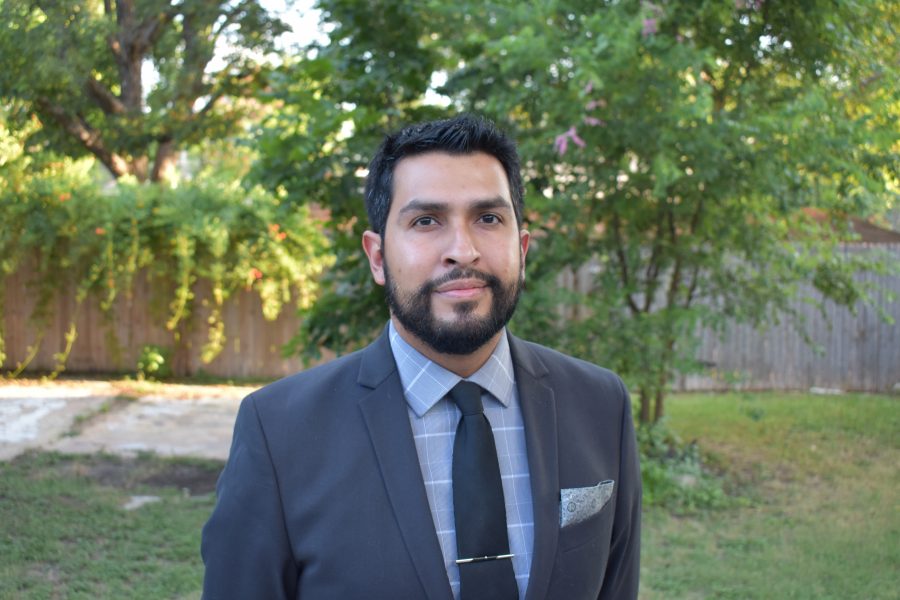Francisco Vara-Orta brings nearly two decades of newsroom experience to his role as IRE’s first director of diversity and inclusion. Vara-Orta joined the IRE staff in February 2019 as a training director. While working as a trainer, he has conducted sessions on managing data and investigative reporting for journalists across the United States and internationally. He has worked for a variety of online and print publications, including Chalkbeat, Education Week, the San Antonio Express-News, Austin Business Journal, Los Angeles Business Journal and the Los Angeles Times. He earned a master’s degree in investigative/data journalism at the University of Missouri and a bachelor’s degree from St. Mary’s University in San Antonio.
What drew you to the field of journalism and how did you get your start?
I was fortunate to grow up in a household under my mom and older sister that valued the news, history and following politics. I come from a working class background where at the time I was the first to graduate from college in my family despite us being here for over 100 years. This was only 2006. But if you know Texas history, you know how Mexicans and Black citizens were segregated and discriminated against, as well as many other groups. I think seeing this play out in my neighborhood planted some of the seeds. I was a shy kid who felt untalented until a woman of color, my Filipino middle school English teacher, told me I was a good writer and pushed me to embrace it. Slowly, I realized I could make a living by writing about the community around me and passing along vital knowledge, so that helped me fall in love with the craft. I got my first job as a paid writer at age 17 in a bilingual English/Spanish newspaper in San Antonio and was interviewing the governor shortly thereafter on a highway infrastructure project during my summer break. Twenty years later, I still get that rush when “reading the paper” – be it usually now on my phone from a variety of different platforms.
You were recently announced as IRE’s first director of diversity and inclusion. Can you tell us more about your new role and some things you hope to accomplish in it?
I was initially hired a few years to train newsrooms and classrooms on better data and open records process. But as time went on and the pandemic and high profile attacks on people of color gripped the nation, as the only person of color then on IRE staff, what I kept getting asked about or felt the need to surface had to do with DBEI. It’s been a slow journey that can’t move fast enough I know and we have seen this in cycles. Just this year though, as we know representation matters, we now have three people of color on staff, including our executive director, and a Black board president and vice president – with the whole board coming from historically marginalized groups in newsrooms and U.S. society. So we are doing the work externally and internally and our chief, Diana Fuentes, wanted to better formalize that work in creating this role for me as we don’t see the need diminishing.
With our mighty team of 13, we have started reviewing IRE’s extensive curricula through an equity lens, rewriting some courses and creating new ones to expand opportunities for historically underrepresented communities. We will also be bolstering IRE’s relationships with partner organizations dedicated to more inclusive work and offering support to journalists working to be more culturally competent in their reporting, hiring and retention approaches. And we have our first ever DBEI symposium coming up this month to push forward these critical conversations and forge them into sustainable action.
What would it have been like to have the Ida B. Wells Society early in your career?
It would have made a tremendous impact. I didn’t know where to look for a role model as a gay Chicano journalist who wanted to do investigative and data work. I felt people did want to help though from different backgrounds and that patchwork of support did help me get here. At IRE, we openly talk about that people of color, women and queer folks, among others, didn’t feel welcome. I didn’t know who Ida B. Wells, Ruben Salazar and Jovita Idár were and that they were investigative journalists of color when I was growing up. I am so glad they are finally getting their due. We are their wildest dreams indeed.
We know that diversity in newsrooms is something that is lacking. What advice would you give to aspiring journalists who don’t see many reporters that look like them?
Seek out learning about the history of your ancestors and those alive today who went before you. They are around. They have faced what you have, often in more brutal terms and with deep isolation. We shouldn’t have to rely on such a deep well of emotional resiliency and deep devotion to the purpose of our craft, but when you are the only who looks, sounds, or dresses the way you do in your space and you earned a pass into the newsroom, you feel that responsibility to stay in the field. However, we are now talking about self-care and coping directly with trauma through therapy, meditation and healthy lifestyle habits. Hold onto those values in taking care of yourself so you can make it in the long haul. I would always stress to challenge yourself to learn a new skill annually: data analysis, open records knowledge, leveling up your writing, or taking a scary job opportunity out of your comfort zone at some point. Take stock every year or so and confront if you feel satisfied and want to stay put as you may still be growing where you are or simply just enjoying the work, or jump and reinvent yourself in a new role in the journalism industry. I never thought I would be a trainer for IRE 20 years ago! You have so much to offer the world.
Next week, IRE will be hosting its first symposium online focusing on diversity, belonging, equity and inclusion (DBEI) issues for newsrooms. Can you talk about why you think this type of conference and DBEI work is so crucial for journalists?
Our team at IRE wants to help journalists and newsroom management better center our work with a sharper focus on cultural competency and inclusion – which I feel for the sake of the democracy is quite urgent in journalism with so much division and disinformation. IRE has long been known as somewhere you get data and FOIA skills, but that’s no longer enough to do the work this moment calls for in our world.
Zooming out, we know we can learn so much from one another and that is what will be needed to make our multicultural society reach its true promise, a hope I hold onto on the darkest days of the news cycle. The communities we cover deserve the best coverage we can provide, and so do we as “journalists of conscience,” as Maria Hinojosa described us at one of last year’s IRE sessions. So it’s imperative we help create such a space for like-minded journalists and doing so safely in a global pandemic with ups and downs that has disproportionately affected those most marginalized. I hope we can lay some groundwork at this event to build on for 2022 when we can all get back in person safely again as these conversations are critical to be in person, but journalists are resourceful and adaptive so hope y’all will join.
The symposium will include a mix of panels, small-group conversations, networking and master classes, which are 2- to 3-hour deep-dive workshops. It’s a history-making moment for the investigative and data journalism space.
IRE members can register on their website. There’s also a special registration discount for IBWS members!
When you think about the future of IRE and especially in your new role. What are you hoping to see?
I owe a lot to my mentors and ancestors whose shoulders I am built upon and want to do my part as DBEI director to help pay it forward. It’s important we help our colleagues improve their newsroom environments and provide nuanced, thoughtful coverage for all communities, especially those historically marginalized we have failed as an industry. I want people to feel good about attending our events, as I think all of us at some point may have felt alone or unsure at stages of our careers digging into stories that provoke adversity outside and even inside of our newsrooms. Hence, IRE must help provide the mentorship and training that advances our members’ work in the communities they cover, and their careers so we retain them. I want to see our membership grow among all demographics, of course, but with a special focus on better reflecting the communities we write about to meet the long championed parity goals we haven’t met as an industry. I want people to feel empowered on how to be their best selves as professionals and take care of their overall health in the process – my North Star on inclusion. ¡Adelante!

